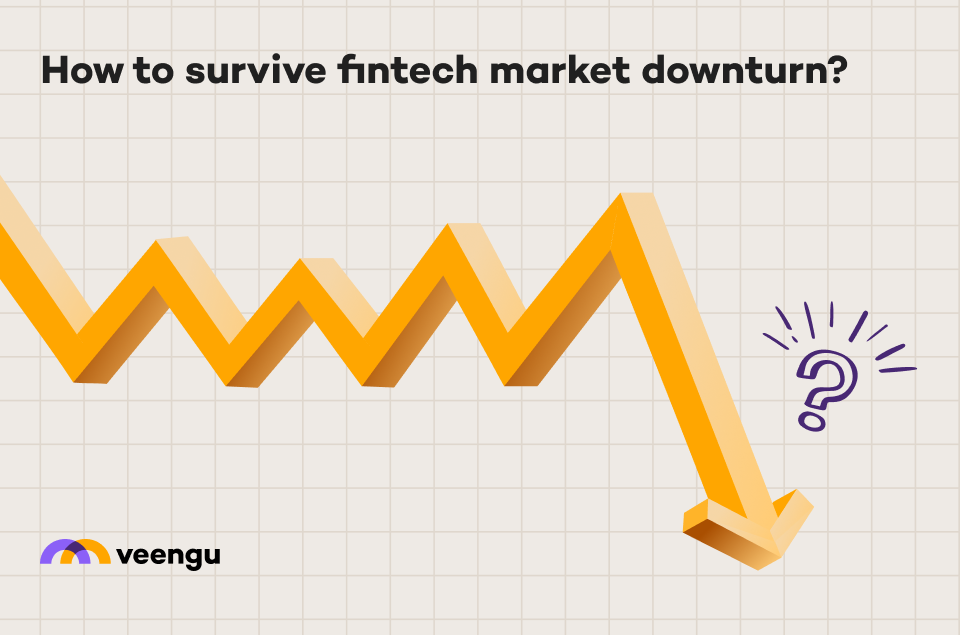Signs of fintech market downturn
Signs of the fintech market downturn can include various indicators and trends. Here are some potential signs:
- Decrease in Funding Rounds: A significant drop in the number of funding rounds and the amount of investment flowing into fintech startups may indicate a downturn.
- Reduced Valuations: Lower valuations for fintech companies during funding rounds or in public markets can be a clear sign of a market correction.
- Startup Closures or Consolidations: If a notable number of fintech startups are closing down or merging with other companies, it could indicate a challenging market environment.
- Lack of New Entrants: A slowdown in the number of new fintech startups entering the market may suggest decreased investor confidence or increased barriers to entry.
- Regulatory Changes: Sudden or stringent regulatory changes can impact fintech companies, particularly those operating in areas heavily influenced by compliance and legal frameworks.
- Customer Acquisition Challenges: If fintech companies face difficulties in acquiring and retaining customers, it could be a sign of increased competition or a shifting market dynamic.
- Slower Adoption of New Technologies: A slowdown in the adoption of emerging technologies like blockchain, AI, or decentralized finance (DeFi) within the fintech sector may indicate a reduced appetite for risk.
- Decline in User Engagement Metrics: A decrease in user engagement metrics, such as active users, transaction volume, or time spent on platforms, can be a red flag.
- Increased Regulatory Scrutiny or Enforcement Actions: Fintech companies facing heightened scrutiny or regulatory actions from authorities may be indicative of a more challenging operating environment.
- Market Volatility and Economic Indicators: Broader economic indicators like stock market volatility, interest rates, and GDP growth can impact the fintech market. A downturn in these areas can indirectly affect the fintech sector.
- Shift in Investor Sentiment: Negative sentiment from prominent investors or venture capital firms towards the fintech sector can influence market confidence.
Fintech market crash 2022-2023
The global fintech industry is facing some big problems that are slowing down its growth. One of the main issues is that it’s not getting as much money from investors, especially from venture capitalists.
A report from KPMG called “Pulse of Fintech H1 2023” shows these problems. Here are some important things it found showing the fintech market downturn:
- In the first half of 2023, fintech companies around the world only got $52.4 billion, which is 17% less than the $63.2 billion they got in the second half of 2022.
- In Europe, the Middle East, and Africa (EMEA), fintech funding went down a lot. They only got $11 billion compared to $27 billion in the second half of 2022.
- In the Asia Pacific (APAC) region, funding also dropped. It went from $6.8 billion to $5.1 billion.
Some companies, like Dave, a bank in the US, saw their value drop a lot in the past year.

This shows that it’s a tough time for fintech companies to get money from investors. Investors are being more careful because the market is not very stable right now.
According to the report, the part of fintech that deals with payments is still doing the best. Other areas like supply chain and logistics, as well as green fintech, are also getting a lot of money this year. KPMG thinks that people will keep being interested in artificial intelligence (AI) because it has a lot of potential.
Even though these are the trends, KPMG thinks that fintech funding will likely stay low in the second half of 2023. The report says that things like high prices, higher interest rates, political tensions, and problems in the tech industry could be risks for the market.
Because there’s not as much funding, there’s a worry that some fintech companies might go out of business. This is not good for banks and other businesses that rely on fintech services. It could cause big problems for them, like disruptions or even total failures in their important operations.
How to survive fintech market crash?
To deal with these tough times, businesses can think about ways to save money like:
- Using efficient software like the Veengu core platform for fintech.
- Investing in technology to make things work better, save money, and make customers happier. This can help businesses compete better.
- Keeping up with any new rules and making sure to follow them. It’s really important to manage risks well to keep trust and avoid legal problems. Using automated tools for this can help.
Getting through a hard time in the economy means being smart with money, focusing on customers, and being able to change. By facing problems head-on and making good choices, fintech leaders have a better chance of not just surviving, but also doing well in the long run.
It’s important to note that a downturn in the fintech market may not necessarily imply a permanent decline. Markets are cyclical, and downturns can be followed by periods of recovery and growth. Monitoring these signs can provide valuable insights into the current health and future prospects of the fintech sector.
And to end on a positive note, I want to share something from an article by Ben Robinson called “Fintech After The Crash.” He says, “The good news is that fintech is still a really good and growing area for new ideas. It’s the world’s most profitable market with lots of old-fashioned ways of doing things and digital services that can be done better. There’s a lot of room for improvement and new ideas.”

